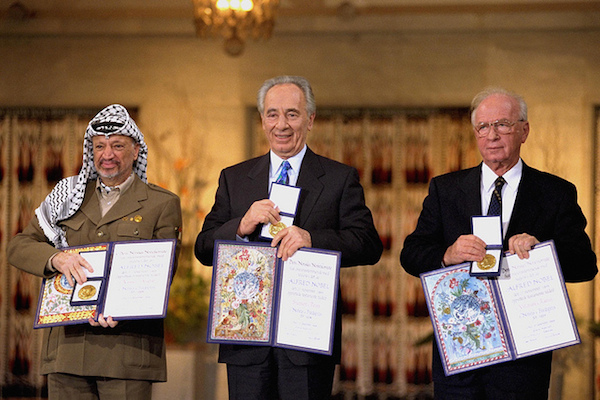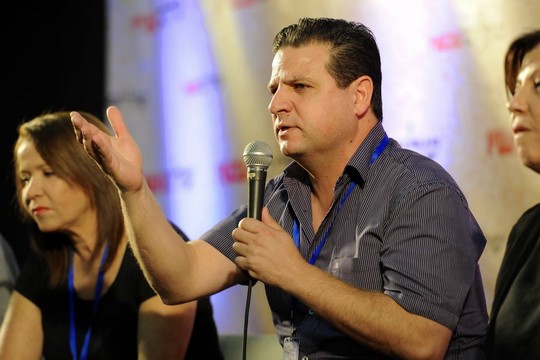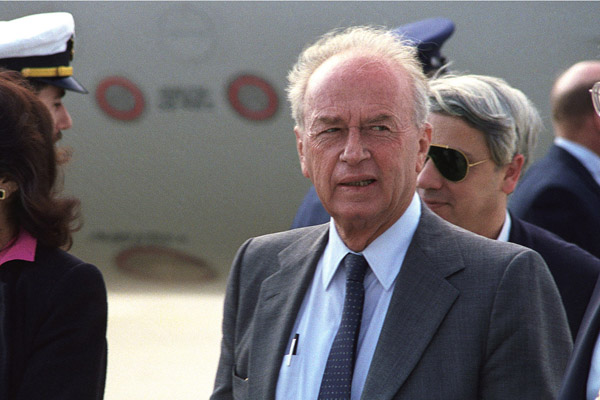People generally associate Rabin’s legacy with the Oslo Accords, for which he was later murdered. Less cited is the fact that Rabin’s revolution was dependent on a one-time collaboration with Arab members of Knesset. Today, just like then, that remains our premier task.
By Ron Gerlitz
When I was in basic training in the army, our commanders woke us up in the middle of the night to tell us Rabin had been elected prime minister. The night he died, I was on a naval patrol boat on a routine and not-so-heroic mission off the coast of Lebanon. The radio was the most interesting form of entertainment that cold night — that is, until I heard about his murder.
A few minutes later, while still trying to get over the shock of it, soldiers from the ship’s bridge yelled to us that we were being shot at from the coast. I ran upstairs and saw something I will never forget; a red stream of tracer bullets raining down in the direction of Al Rashidiya Refugee Camp. It took me a while to realize they were not shooting at us, and were rather celebrating the death of Rabin. I calmed down.
I stopped the boat and continued to stare out at the rain of lights over the refugee camp in southern Lebanon. I was young and naïve. I saw but I didn’t understand. I mean, wasn’t Yitzhak Rabin a man of peace? Why the hell were they so happy about his death? The Palestinians, refugees of villages in the Galilee who had been relegated to a refugee camp since 1948, were less naïve than me. They hated Israel and were rejoicing over the death of the prime minister. That same bitter night, when pistol shots in Tel Aviv revealed the fault line within Israeli society, I witnessed other shots fired in Lebanon and I learned a lesson about the intensity of the Palestinian-Israeli conflict.
The formative experience I underwent that evening was probably partially due to the fact that life led me to the Jewish-Arab battlefield, and that is where I am, marching through a ravine with Jews and Arabs trying to forge a solution to the conflict between two peoples who share a common homeland.

Rabin’s revolution
Rabin was basically the only prime minister who tried to solve the conflict. It is important to remember the base of support he had at the time, which enabled him to engage in that bold act with the Palestinians. While it may not be the most striking aspect of Rabin’s popular legacy, one of the most courageous and important things he did was to make a political alliance with Arab citizens. He was the first Prime minister, the only one to date whose government relied on the support of Arab MKs. In the 1992 elections, the Labor party received 44 seats, Meretz 12, Hadash 3 and Mada (the Arab Democratic Party) 2. Shas got 6 seats, joined the coalition and then left in September 1993 when the Oslo Accords were signed. From that moment, it was a minority government (56 MKs), supported externally by parties who represented the Arab public, Hadash and Mada.
Rabin was, therefore, the only prime minister to shatter the heretofore-undemocratic consensus that dictated the government ought to constitute a Jewish majority. Instead, his government was based on a majority of citizens, which included Arab citizens. The agreement between Rabin and representatives of the Arab citizens stated that as long as the government strove for peace with the Palestinians and advanced equality for its Arab citizens, Hadash and Mada would prevent the Right from toppling it. The two sides upheld the agreement and the Arabs supported the government by blocking all the no-confidence measures it could. In this way, it enabled the government’s existence.
For the next two years, Arab citizens continued to influence Israeli government policy in unprecedented ways. They were not part of the coalition but their support enabled the government not only to survive but to carry out the most dramatic changes since the founding of the state: recognizing the PLO, signing the Oslo Accords, and setting in motion a process to reduce disparities between Israel’s Jewish and Arab citizens.
This fragile political agreement between the Zionist Left and the Arabs was maintained until three shots fired by a man of the extreme-right killed the prime minister. Twenty years later, if the Left wants to return to power and save the nation from collapse, and if Israel’s Arab citizens want to end the occupation of their brethren in the West bank and Gaza and reduce discrimination against themselves, the two sides need to restore the political alliance of Rabin’s government.
We have a partner in Knesset
I am not as young as I was that night, but am I still naïve with regard to the Arab-Israeli conflict? This is where the pessimists come in. They will say that because of the current status and the views of the Labor Party, there is no chance this will happen. Indeed, in order for the party to be a partner in this process, it will need to undergo a profound change. But remember that in 1990 the Labor Party was part of the government under the leadership of Yitzhak Shamir, and Rabin — the security minded Rabin, the defense minister, the hawk whose role it was to crush the Palestinian uprising, and who infamously said, “break their hands and legs.” Only three years later, that same Rabin stood as the prime minister of a minority government that drew its power from Arab citizens and which signed an agreement with the Palestinian leadership, setting in motion those dramatic acts.
I am tired of leftists scrambling to explain why the Left will never ever return to power. Instead of releasing ominous predictions, we need to roll up our sleeves and begin to rebuild the pact. This is also something we can learn from Rabin. He was a leader who was busy changing reality and not intimidating the nation, like the current prime minister is busy doing.
It is possible to restore the pact. The 2015 elections proved that the Zionist Left and the center found it difficult to amass 61 seats. Among more and more members of the Left the understanding is beginning to take hold that we have to strike a political alliance with the Arabs. By the way, as Hillel Ben-Sasson wrote, this alliance must and can include both Arabs and the Haredim.

And what about the Arabs? Do they even want this? Many say no, but this is yet another claim grounded in a lack of familiarity with the Palestinian public and its leadership, for the opposite is true. Before the elections, Ayman Odeh, the head of the Joint List, detailed the conditions under which Herzog government, should it come to power, would receive external support from the Joint List: the government must follow a serious and genuine path toward peace and security, implement a plan for eliminating disparities between Jewish and Arab citizens, end home demolitions and agree that representatives of the Joint List receive positions as heads of committees in the Knesset, including committees belonging to the Interior Ministry. MK Ahmad Tibi expressed similar sentiments before the elections. In any case, this sort of agreement enjoys widespread support among members of the Arab public.
In truth, most of the Arab public believes in supporting the government not only externally, but also through joining the coalition. In other words, it is certain that most of the political leadership of the Arab population will gravitate toward providing at least external support. The only uncertainty comes from Balad’s representatives; their opposition to signing a surplus agreement with Meretz does not bode well in this respect. But if the votes of the Arab MKs are ever required to establish a leftist government and throw the Right out of power, there will be a majority; this is evident.
Within civil society, there is already an effort underway that aims to construct the ideological and public foundations for this type of political alliance. In the next few months, Jews and Arabs will gather to draft proposals and agreements that will provide the foundations for a future pact to be built, and god willing, a left-wing government will rise with the support of the Arabs.
This political pact is the task of our lives. It will be a difficult alliance for both sides. The Arabs’ political strengthening will cast its entire political weight, affecting government policy both with regard to collective rights and national rights. It won’t be easy for Arabs to move from perpetual opposition to a place of support for the government, and separatists within Israeli society will attack the alliance. The extreme anti-Arab right, which has been strengthened considerably in recent years, will go ballistic that this government relies on Arab support; de-legitimizing Arab participation in the ruling class will be one of the political achievements the Right will fight to maintain. City squares will fill with blood-thirsty demonstrators and the Shin Bet will have to keep the prime minister in a hermetic security bubble.
There is no doubt that in the realities of 2015 restoring the political alliance between the Left and the Arabs will be a very complicated process. But for God’s sake, what is the alternative? In the last month, we have been reminded of the nightmare the government of the Right is leading us toward: a violent, unsolvable conflict with the Palestinians in the West Bank and Gaza, daily terror, an intensifying internal conflict between Israeli and Arab citizens which threatens to escalate into a violent civil war, and a perpetual weakening of the glue that binds Israeli society. With regard to any of that, the prime minister is winning; the one who placed historical blame on the Palestinians for killing the Jews of Europe and who runs the risk of inflaming the entire system, drowning us and our children in blood.
But remember, the future is still unwritten. There is only one way to avoid the nightmare described above: return to Rabin’s legacy and restore the political alliance between the Zionist Left and Arab citizens. Together, let’s try again — for the second time — to end the Israeli-Palestinian conflict and promise our children a good life in a shared homeland.
Ron Gerlitz (ron@sikkuy.org.il) is the co-executive director of Sikkuy, the Association for the Advancement of Civic Equality. This article was first published in Hebrew on Local Call. Read it here.


